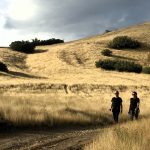
Here I sit, practicing a solo version of “You Are My Sunshine” on my harmonica—the same instrument that my grandfather taught me to play. His was a unique style, a combination of single notes offset by a lower beat that traced the music but didn’t define it. A back beat, somewhat like a bass guitar.
I haven’t picked my harmonica up for over a year. Though I’d love to be able to play it better, it’s one of those things that takes more practice than my patience allows. I suck and blow. The tune comes out all right, but it sounds like the standard mixture of solo notes and chords that any harmonica can produce. Mine is a Hohner Marine Band in the key of C that I bought from a 1-800 number for half what you’d pay anywhere else. I run through “You Are My Sunshine” once again. From another room, my wife exclaims that it sounds like it’s coming together. Whew. I’ve played in public only once before, and that time I messed up. This time it’s got to come together.
A few months ago, Mom called. “We’ve decided to go through with it.” She said it as though she were selecting bananas at the grocery store.
“Really. What does Grandma think?”
“She’s actually looking forward to the break. She’ll be coming here to stay for a few days.”
“Are you okay with this?”
“I’m fine. We’ve done everything we can for him. They’ll take good care of him there.”
“Mom, I think you’re making the right choice.”
“I hope so.”
Grandpa was going to a rest home. A short time later, after a brisk morning of water skiing, my brothers and I reflected on the news.
“I remember when he’d tickle us. I got a new sleeping bag for Christmas one year. He said, ‘Get on in and try it out.’ I climbed in. He tickled me so long that I finally wet my pants. Good thing the bottom of the bag was plastic.”
“A month ago we thought he was gone. We were driving up to ski at Grand Targhee. I called Mom along the way, and she said that we’d better stop by, that he’d had a bad spell and the doctors at the hospital said he could die there or at home. Mom said that he was taking a nap at home but that we should probably pay our last respects while he was still coherent. When we got there, he had just woken up. It was like he’d got a second wind. There was no sign of death anywhere. The guy was just like he used to be. He teased the grandkids, scared my little girl away with his bear sounds, and talked like we had all just stopped by for a bowl of ice cream.”
“His condition’s so weird—like a Walkman whose batteries are running out of juice so the music plays in surges. Stop it for a minute, push ‘play’ again, and the sound is perfect for about two seconds until it goes into super slow-mo.”
“The sad thing is remembering how he used to be—back in his prime. When you look in his eyes, you can still see the man that has always been there. But check out his body—he’s all hunched over; his skin looks like it’s covered with wet paper. He’s not the same person.”
“I wonder if that’s what my kids see—an old scary man? I remember the real Grandpa, the one that would give us ice cream until we got sick.”
“It’s too bad everyone can’t still see him that way. Even my wife barely knew him before he got Parkinson’s. She sees him as a little strange.”
“Grandma and Grandpa came to my house not too long ago. I sat there looking at the two of them on my couch, as old and feeble as can be. I asked if I could take a few pictures of them. They snuggled right up together, and Grandpa had that goofy smile that made you feel so loved. I just started to bawl—thinking of all they’ve done for me and feeling this might be the last time I’d see them together.”
“How’d the pictures turn out?”
“Oh, fine. I told them how much I loved them, and they both looked at me like I was dressed in a clown suit. I could see them going, but they seemed to see nothing but life together forever.”
“Funny—now that he’s so out of it, do you think he’s just a soul trapped inside a body prison? I mean, do you think he’s got thoughts like ‘someone get me out of here’ or ‘just let me die—don’t change my diaper or bathe me or feed me. Take that oxygen away.’”
“Come on. You can’t say things like that. I bet he’s happy. He’s eighty-five. I bet he thought he’d never make it past seventy.”
“If I lived to eighty-five I’d be stoked. It’s like spring is over, and we’re moving toward the longest day of the year. You know, like relishing the first day of summer, when the sun comes up long before you wake up and goes down way after you’ve gone to bed. I can’t imagine a nicer day.”
“Well, his name is Vernal. Very springlike, stuff growing everywhere. That’s Grandpa.”
Later I asked Grandpa how he felt about life. He sort of drifted around but came back with this: “I spent my life as a farmer. I learned a lot from the earth.” Grandma had been holding his hand, more patiently than I’d ever seen. “When I was young and didn’t have the expensive equipment I had later, I had to irrigate my crops by hand. I had to take my water turns whenever they came. Sometimes they came in the middle of the night. Since the fields were a mile or so from the house and since the water needed changing every few hours, I figured out a way to sleep through the night and make only one trip to the house.”
“Really?”
“Well, water travels downhill, you know. I would go to the end of a row and sleep there—on the open ground. When the water came to the end of the row, I would obviously wake up.”
“Did you ever get soaked?”
“You know, I usually didn’t sleep well just thinking about the possibility of a soaking. I still have nightmares about getting soaked.”
A few days after we spoke, I picked up the phone.
“Hi, Mom. I’ve been thinking about Grandpa a lot lately. Is he okay?”
“I think so. Harvey, his old neighbor, visited him on Monday and said Grandpa was okay, that he seemed happy.”
“I just started thinking about how lonely he must be. I’ve heard so many stories of people who abandon their old people in rest homes. I just wish there was something I could do from this distance.”
“Maybe you should visit.”
“Mom, do you think we should pray for him to die?”
“No, not yet. I’m not ready to lose him.”
“What’s ‘ready?’ Maybe he’s ready to go but is just waiting for us to be ready for him to leave. It’s like he’s stuck in summer and can’t make it on to winter—like the longest day of the year gone bad.”
The leaves were beginning to turn to reds and oranges when my sister called. “We took Grandpa his harmonica. He’s so bad that he can’t remember how to play it anymore.”
The next time the kids were out of school for a few days, we took a road trip. We drove along the Wasatch Front, past the cities and towns of northern Utah, and into the windswept regions of southeastern Idaho, where everything was the color of wheat ready for the harvest. We drove into Rexburg hoping for a good experience for the sake of the kids. My sister had encouraged me to take my harmonica, just in case.
When we arrived, he was asleep, hooked up to oxygen. We left to find a nurse, who said we could wake him, but when we went back into the room, his eyes were open.
“Hi, Grandpa.”
“Hi, Brett.” I was surprised he called me by name.
“How are you doing?”
“I’m so warm and comfortable, feel like I’ve just been to heaven.”
The kids sang “I’ve Been Working on the Railroad,” a song they had prepared for him. He started to sing along, softly. He was feeble, but his mind was clear. Maybe this was his way of getting it all together for one last good visit.
“Grandpa, do you want to play the harmonica with me?”
“Sure. I’ve got one in my top drawer. I’m not sure how well I’ll be able to play it.”
“Do you have any favorites? How about ‘Home Sweet Home?’”
He started playing with the harmonica flipped over so the high notes were on the wrong end. After a few blows, he recognized his error. He switched it and began softly playing a familiar tune with an equally familiar style—the back beat was fainter but stylistically prominent in his playing.
It was his turn to request a song: “Do you know ‘The Bear Went over the Mountain?’”
I’d never played this one before but found the tune easy enough. It was one of our better duets. As a kid, I’d played duets with him while Mom snapped pictures. The duets seemed to meander wherever he’d take them, leaving me feeling like I was trying to catch a fly that was buzzing around my head. I’d just about catch up when off he’d go again. But this time it all seemed to work out.
As we played, a few nurses gathered in the doorway, and his roommate began to sing along. My wife and children joined in. We played several songs, from “Oh, Susanna” to “Turkey in the Straw,” which he admitted he’d never played before. Everyone clapped.
“Grandpa, you’d better rest a little.” He looked winded and a little pale. He rested his head back on his pillow and held the harmonica up in the air, looking at it like it was a good friend that had just come home after a long time away.
Then he looked at me. “You know, I used to get one of these every year for Christmas. I knew I’d be getting one, but that didn’t take any of the excitement away. Sometimes it would be a long one, sometimes a short one. Sometimes one with holes on both sides in two different keys. I’d play them so much that they’d wear right out. A reed would go, or something else would happen. I’d tear them apart and fix whatever I could. It’s not so fun to play one with a missing note. I used to take one in the fields with me, just throw it in my pocket and go. It was the best friend I could ever have. If ever I had to wait for the irrigation to be finished, I’d just take it out and play. That’s how they are. If you’re ever frustrated or lonely, you just take one out of your pocket and play, and soon enough it’s time for dinner or bed.”
For Grandpa, he was waxing eloquent.
“It’s not like other kinds of instruments, like a trumpet or a clarinet. There’s really not much of an investment. For ten dollars, you can buy one. The key of C is the best, even though there are lots of keys. Lots of people play. Some of them sound bad, but some can do very interesting things on one of these. Even if you’ve never played, you can really only go up.”
“Grandpa, thanks for teaching me how to play.”
“You’re welcome. Maybe I’ve given you something you can use your whole life long.”
“You have, Grandpa. I’m more like you than any man I know. Just suckin’ and blowin’.”
A few days later, my wife and I were watching TV. An image of a young boy flashed on the screen. He was beginning a race. He turned to the boy next to him and said, “I’m going to win this for my grandpa.” The next image was of the finish line, where a very old man stood, obviously the boy’s grandfather. The gun fired, and the race was off. Other racers crowded the young boy, causing him to stumble and fall. We watched him there, kneeling on the ground and crying about the chance he had missed to prove to the world and especially to his grandfather that he could win. Then he looked up and saw his grandfather signaling him on. “Come on,” I thought. “Get up. Go the rest of the way. There’s somebody there that wants you to at least cross the finish line. Come on!” The boy got up. He ran across the finish line and into his grandfather’s arms. Because he was such a small boy, his grandfather picked him up and swung him around, holding him tight, the two of them crying together for the accomplishment.
I cried—no, sobbed like a baby—for about an hour. My wife held my head, stroked my hair, and didn’t say anything. She understood better than I did what I was feeling.
…
“Honey, it’s time to go.” My wife’s voice brings me back to the present.
I put the harmonica, my friend, in my pocket and straighten my tie. It is a frosty Idaho morning. We drive to the church. Inside, I hug Grandma. She hands me a harmonica and says that I should use this one. It was his. He taught me about this instrument, but until my last visit with him, he’d never talked about it, just played it. Long summers alone, watching sheep graze among the sagebrush. Days and nights waiting for the irrigation water to reach the end of the row. Always a friend. Always in his pocket. Always an upbeat song at a lonely time.
Now I know what it meant to him. At the family viewing and prayer, moments before the funeral is to start, I slip the harmonica that Grandma gave me into his shirt pocket. He will still need it for those lonely times while he is waiting for the rest of us to come down the row, a posterity that he planted and watered carefully. I pat his pocket and say, “I love you, Grandpa.”
I reach in my pocket and locate my own harmonica. I’d learned to play by watching him—how to hold it, how to wave fingers to create vibrato, how to bend the reeds to achieve nice effects. In private, I’d struggled to copy the inimitable back beat that he employed. His songs run through my head: “Oh, Susanna,” “Home Sweet Home,” “You Are My Sunshine,” “The Bear Went over the Mountain,” “Turkey in the Straw.”
Since none of his sons ever learned to play, I am the only descendant who can carry a tune in his hands. So when they asked me to play at his funeral, I agreed. We decided that two of my cousins would play the guitar and the rest would sing along—nearly forty in all. I would have picked “How Great Thou Art,” which as a kid I’d come to believe was a dedication to the person in the casket. They picked “You Are My Sunshine.” As I practiced, I grew to appreciate the song for how it mirrors Grandpa’s life like a clear reflection in a high mountain lake.
I stand to play at the mike while my cousins come forward in the old Idaho chapel. I look at my harmonica. Just like each of his, the silver is worn around the middle where lips have frequently moved. I swallow the urge to cry. “He taught me to play this song only a few weeks ago in the nursing home,” I say as I begin to slowly play “The Bear Went over the Mountain.” People in the congregation seem to be singing along.
After one verse, the grandkids are gathered. We play a short intro. Then,
You are my sunshine
My only sunshine
You make me happy
When skies are gray
You’ll never know dear
How much I love you
Please don’t take my sunshine away.
The chapel rings with children’s voices and guitar and harmonica. It is a great moment. I play single notes, careful not to slur them as I move my mouth along the harmonica. In the second verse, I bend a few notes and improvise slightly. As I enter the home stretch, without my thinking about it the back beat—his unmistakable back beat—creeps in. Single notes with a twist, offset by a lower beat that traces the music but doesn’t define it, the beat that has taken me years to find.
You’ll never know dear
How much I love you
Please don’t take my sunshine away.
I try to stop the back beat in vain, but it continues through the chorus. My tears embrace it by the conclusion. No one in the audience seems aware that I am sharing Grandpa with them—it is the payoff of my ambition to be like him. I look down at the closed box and realize that this song is truly his, that he is playing, not I. It is his breath that draws and blows, his cupped hands and waving fingers, his pursed lips and curled tongue, his back beat.
And the sun stays high in the sky while he continues to play in me.





